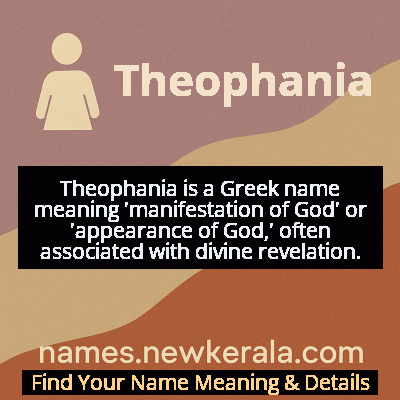Theophania Name Meaning & Details
Origin, Popularity, Numerology Analysis & Name Meaning of Theophania
Discover the origin, meaning, and cultural significance of the name THEOPHANIA. Delve into its historical roots and explore the lasting impact it has had on communities and traditions.
Name
Theophania
Gender
Female
Origin
Greek
Lucky Number
7
Meaning of the Name - Theophania
Theophania is a Greek name meaning 'manifestation of God' or 'appearance of God,' often associated with divine revelation.
Theophania - Complete Numerology Analysis
Your Numerology Number
Based on Pythagorean Numerology System
Ruling Planet
Neptune (Ketu)
Positive Nature
Intuitive, analytical, spiritual, and inquisitive.
Negative Traits
Secretive, reserved, aloof, and can be overly critical.
Lucky Colours
Green, yellow.
Lucky Days
Monday.
Lucky Stones
Cat’s eye, moonstone.
Harmony Numbers
1, 5, 6.
Best Suited Professions
Scientists, researchers, spiritual leaders, detectives.
What People Like About You
Depth of knowledge, analytical skills, spirituality.
Famous People Named Theophania
Theophania of Constantinople
Byzantine Empress
Influential 9th century royal who shaped Byzantine court politics and religious policy
Theophania Martin
Religious Scholar
Contemporary academic specializing in early Christian art and divine manifestation theology
Theophania of Saxony
German Nobility
Medieval countess renowned for monastic foundations and charitable works
Theophania Papadopoulos
Classical Musician
Award-winning pianist preserving and innovating Byzantine musical traditions
Name Variations & International Equivalents
Click on blue names to explore their detailed meanings. Gray names with will be available soon.
Cultural & Historical Significance
Extended Personality Analysis
Individuals named Theophania often develop personality characteristics that seem to reflect their name's majestic meaning. They frequently exhibit a calm, centered presence that others find reassuring, combined with a sharp intellect that enjoys exploring abstract concepts and spiritual questions. Theophanias tend to be natural leaders not through aggression but through wisdom and emotional intelligence, often serving as mediators in conflicts and valued counselors among friends and colleagues. Their spiritual orientation doesn't necessarily mean religious orthodoxy—many modern Theophanias express their 'divine manifestation' through artistic creativity, scientific curiosity, or social activism. They often possess a strong sense of justice and fairness, and can be surprisingly stubborn when principles are at stake. Despite their sometimes serious demeanor, Theophanias typically have rich inner lives and deep capacity for joy, finding wonder in both grand philosophical concepts and simple daily pleasures. Their name seems to grant them a perspective that transcends immediate concerns while remaining grounded in practical reality.
Modern Usage & Popularity
In the 21st century, Theophania represents a fascinating case study in naming trends—simultaneously ancient and freshly relevant. While statistically rare (appearing in fewer than 5 births per year in the United States), the name has gained attention among parents seeking distinctive classical names with spiritual depth. The rise of genealogy research and interest in family heritage has contributed to its occasional revival in Greek-American communities. Social media and global connectivity have made previously obscure classical names more accessible and appealing to cosmopolitan parents across cultural backgrounds. The name's modern usage often reflects a rejection of trendy names in favor of something with historical weight and meaningful etymology. Interestingly, while the simplified form 'Tiffany' peaked in the 1980s and subsequently declined, Theophania has maintained a steady, if minimal, presence, suggesting it appeals to a different demographic—typically highly educated parents with interests in theology, classics, or Byzantine history. Its continued use, however limited, demonstrates the enduring power of names that connect individuals to profound spiritual concepts.
Symbolic & Spiritual Meanings
Beyond its literal translation, Theophania carries rich symbolic weight across multiple dimensions. It represents the human capacity for transcendent experience—those moments when ordinary consciousness expands to perceive deeper realities. In psychological terms, the name symbolizes integration of the spiritual and material aspects of human nature. Theophania serves as a metaphor for enlightenment across traditions, comparable to the Buddhist concept of satori or the Platonic idea of anamnesis (remembering eternal truths). In artistic contexts, it suggests works that reveal hidden dimensions of reality or evoke numinous experiences. The name also symbolizes hospitality to the divine—the idea that human life can become a vessel for higher manifestations. In environmental symbolism, Theophania represents those places or moments where nature seems to reveal sacred dimensions, from majestic mountain vistas to intimate garden sanctuaries. Ultimately, the name embodies the hopeful human belief that reality contains depths of meaning waiting to be revealed to those with eyes to see and hearts open to wonder.

